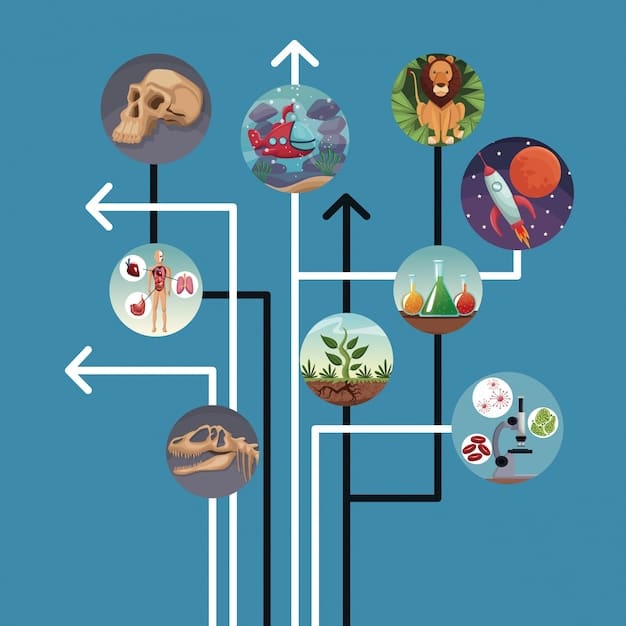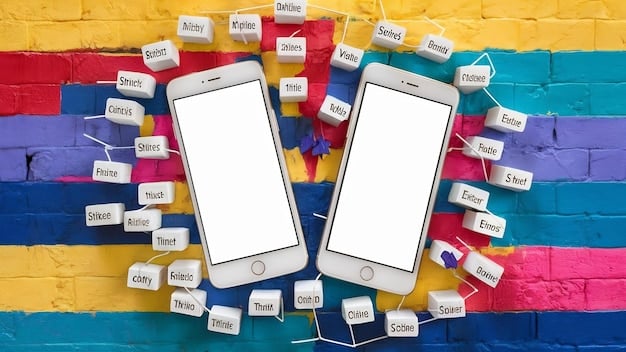Boost Your Vocabulary: The Word Association Technique

Boost Your Vocabulary by 300% in 3 Months: A Step-by-Step Guide to the Word Association Technique offers a practical approach to rapidly expanding your lexicon through creative connections and memory enhancement strategies.
Want to dramatically increase your vocabulary in a short time? The Boost Your Vocabulary by 300% in 3 Months: A Step-by-Step Guide to the Word Association Technique is your key to unlocking rapid vocabulary growth through a fun and effective method.
Why Word Association is a Powerful Vocabulary Tool
Word association is more than just a memory trick; it’s a fundamental way our brains naturally learn and store information. Linking new words to familiar concepts makes them stick.
This technique leverages the brain’s innate ability to create connections. By associating new words with images, stories, or other words you already know, you create a web of associations that makes recall easier and faster.
The Science Behind Word Association
Cognitive psychology supports the idea that memory works through networks of associations. When you encounter a new word, your brain tries to find existing connections to integrate it into your knowledge base. The more connections you make, the stronger the memory becomes.
Benefits of Using Word Association
- Enhances memory retention of new words.
- Makes learning vocabulary more engaging and enjoyable.
- Improves your ability to recall words in context.
- Expands your overall understanding of language.

Word association is a technique that can significantly enhance your ability to learn and retain new vocabulary words. It allows you to tap into your creativity and memory in a synergistic way.
Getting Started: Setting Realistic Goals
Boosting your vocabulary by 300% in three months is an ambitious goal. Setting realistic targets and creating a structured plan are crucial for success.
Begin by assessing your current vocabulary level. A simple vocabulary test can give you a baseline. From there, you can set specific, measurable, achievable, relevant, and time-bound (SMART) goals.
Assessing Your Current Vocabulary Level
Several online vocabulary tests can help determine your current level. These tests often present you with a series of words and ask you to define them or use them in a sentence. The results provide an estimate of your vocabulary size.
Creating a Study Schedule
Consistency is key when it comes to vocabulary building. Dedicate a specific amount of time each day or week to learning new words. A structured schedule will help you track your progress and stay motivated.
- Allocate specific time slots in your day for vocabulary learning.
- Break down your learning into manageable chunks.
- Review previously learned words regularly.
- Use a calendar or planner to stay organized.
Establishing achievable goals keeps you motivated and allows you to celebrate small victories along the way. This, in turn, builds momentum and reinforces your commitment to expanding your vocabulary.
Step-by-Step Guide to the Word Association Technique
The word association technique involves linking new words to familiar concepts, images, or even personal experiences. Here’s a step-by-step guide to help you master this powerful method.
By following these steps, you can effectively use word association to build your vocabulary and improve your language skills.
Selecting New Words
Choose words that are relevant to your interests or areas you want to improve. This makes the learning process more engaging and meaningful. Focus on quality over quantity.
It is important to choose an appropriate number of words when beginning this technique. Starting by selecting less words and building up from there will set you up for success.
Creating Associations
This is where your creativity comes into play. For each new word, think of an image, story, or related word that it reminds you of. The more vivid and personal the association, the better you’ll remember the word.
- Use vivid imagery: Visualize the word in action.
- Create stories: Make up a short story using the new word.
- Relate to personal experiences: Connect the word to something you’ve experienced.
The most effective associations are often the most memorable, engaging your memory and creativity and increasing your capacity to retain information.
Tools and Resources for Vocabulary Building
Numerous tools and resources can aid you in your vocabulary-building journey. From online dictionaries to flashcard apps, these resources can make learning more efficient and enjoyable.
Incorporating these tools into your learning routine can enhance your vocabulary-building efforts and keep you engaged.
Online Dictionaries and Thesauruses
Websites like Merriam-Webster and Thesaurus.com are invaluable resources for looking up definitions, synonyms, and antonyms. These tools can help you understand the nuances of each word.
Flashcard Apps
Apps like Anki and Quizlet allow you to create digital flashcards and test yourself on new words. Spaced repetition, a feature in many flashcard apps, helps reinforce memory over time.
Vocabulary Building Apps
Apps like Memrise and Vocabulary.com offer interactive lessons and games to help you learn new words in context. These apps often adapt to your learning style and track your progress.

Using a combination of these tools ensures you are continuously challenged and engaged in the vocabulary-building process.
Incorporating Words into Daily Life
Learning new words is only half the battle. To truly master them, you need to use them regularly in your daily life. This helps reinforce your memory and makes the words a natural part of your vocabulary.
By actively using your new vocabulary, you’re not just memorizing words; you’re making them an integral part of your communication skills.
Using Words in Conversation
Make a conscious effort to use new words in your conversations. This can be challenging at first, but with practice, it becomes easier and more natural.
- Start with simple sentences.
- Don’t be afraid to make mistakes.
- Ask for feedback from others.
Writing and Journaling
Writing is another excellent way to incorporate new words into your daily life. Keep a journal and try to use new words in your entries. Experiment with different writing styles to see how the words fit.
Actively integrating learned words into conversation and writing will allow language to become far more natural and nuanced.
Tracking Progress and Staying Motivated
Monitoring your progress is essential for staying motivated and making adjustments to your learning strategy. Regularly assess your vocabulary and celebrate your achievements.
Tracking your progress not only boosts your motivation but also offers valuable insights into what works best for you.
Regular Vocabulary Tests
Periodically take vocabulary tests to measure your progress. Compare your scores over time to see how much you’ve improved. This provides concrete evidence of your efforts.
Keeping a Word Journal
Maintain a word journal to track the new words you’ve learned. Include the definition, synonyms, antonyms, and any associations you’ve created. Review your journal regularly to refresh your memory.
Rewarding Yourself
Celebrate your milestones with small rewards. This could be anything from treating yourself to a favorite meal to taking a well-deserved break. Recognizing your achievements helps maintain momentum.
Consistent tracking coupled with rewards transforms the vocabulary-building process into an engaging self-improvement endeavor.
This method will become easier to preform the more it is done. Vocabulary expansion is a life style, not a race.
| Key Point | Brief Description |
|---|---|
| 🧠 Word Association | Link new words to familiar images or concepts. |
| 📅 Study Schedule | Dedicate specific time slots for vocabulary learning. |
| 📚 Tools & Apps | Use online dictionaries, flashcards, and vocabulary apps. |
| 🗣️ Daily Use | Incorporate new words in conversations and writing. |
Frequently Asked Questions
▼
Results vary, but with consistent effort, you should begin to see noticeable improvements in your vocabulary within a few weeks. The 300% increase is an ambitious long-term goal.
▼
Yes, the word association technique can be beneficial for learners of all ages. It’s particularly effective for those who find rote memorization challenging.
▼
Start with simple associations, such as linking a new word to a related image or synonym. Over time, your ability to create more complex and memorable associations will improve.
▼
Aim to learn 5-10 new words per day. It’s better to focus on mastering a smaller number of words than to overwhelm yourself with too many at once.
▼
Yes, the word association technique can be applied to learning any language. The principles of linking new words to familiar concepts remain the same.
Conclusion
By following this step-by-step guide, you can effectively boost your vocabulary by 300% in 3 months using the word association technique. Remember to stay consistent, track your progress, and celebrate your achievements along the way. Happy learning!





